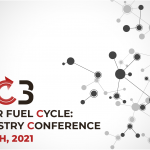Post originally from the Institute of Energy and Climate Research Nuclear Waste Management and Reactor Safety (IEK-6).
The deadline to submit your abstract is 23 May 2021.
The safe management of nuclear wastes is one of the great scientific and societal challenges of the 21st century. The Scientific Basis for Nuclear Waste Management (SBNWM) symposia, originating from the Materials Research Society (MRS) meeting in 1978, address fundamental and applied material science aspects in the context of nuclear waste management. This symposia series provides an ideal platform for experts and young scientists from international research and waste management organisations to exchange information on recent developments of research related to the safe management and disposal of nuclear wastes.
The 45th symposium will be held in Cologne, Germany and focusses on all key scientific challenges for the safe treatment and disposal of spent nuclear fuel (SNF), low-, intermediate-, and high-level nuclear wastes from commercial power generation, medical isotope production, and from spent fuel reprocessing. This includes an overview of international research and waste management programs, technologies for interim and long-term storage and disposal as well as new and innovative technologies. Furthermore the design and operation of waste immobilisation facilities, repository design and licensing will be addressed. Waste form and engineered barrier system design and properties, advanced characterisation techniques, radiation effects, chemistry and transport of radionuclides, long-term predictions of repository performance, complementary modelling and simulation tools as well as nuclear safeguards are other topics that will be presented at the symposium by internationally renowned speakers and leading researchers in the field. Traditionally, as the conference is held outside of the United States, a tour to a nuclear facility or research center (e.g. Forschungszentrum Jülich) is planned.
Comments are closed.





